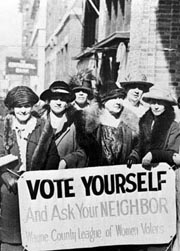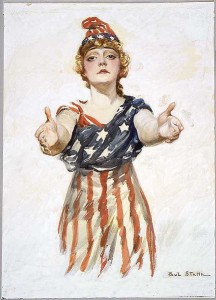 After 1980 women began voting in larger numbers than men: 10% more women than men voted. Women vote for more liberal and democratic causes, such as health care and welfare, firearm restrictions, pro-abortion rights, and family-centered issues.
After 1980 women began voting in larger numbers than men: 10% more women than men voted. Women vote for more liberal and democratic causes, such as health care and welfare, firearm restrictions, pro-abortion rights, and family-centered issues.
In 2013 when Washington, D.C. was about to shut down, twenty female senators, led by Susan Collins, met and proposed a plan which resulted in halting the shutdown. Partisan politics was put aside. This is only one example of how women function effectively in D.C. Women congressional members explain that they work well together, look for common ground, are disinclined to grandstand, stay open to new ideas, are collegial and listen. They get people in a room and talk. In D.C. there is a congressional women’s club, formed 20 years ago by Barbara Mikulski, to provide a “zone of civility”. They meet for lunches, have bridal and baby showers and play dates for their children. As of 2013, women chaired ten of the twenty Senate Committees. They pushed through legislation to fund women and children’s health research, testing and treatment, passed the Lilly-Ledbetter Fair Pay Act and other anti-discrimination laws, mandated maternity and family medical leave and homemakers IRA [stay-at-home parents are allowed to deduct contributions from retirement plans]. Funding for Planned Parenthood was sustained. Gender-blind legislation passed by women included Stabenow’s farm bill, Boxer’s transportation and water resources bill, Murray’s budget and Mikulski’s appropriations bills.
In Broad Influence: How Women are Changing the Way America Works, 2016, author Jay Newton-Small emphasized that women have innate qualities that make their leadership different from men and more effective as they are more prepared and collaborative. As women are reaching the “critical mass” of 20-30% representation in any work place: military, private industry, government, their voices can be heard, thus advancing women’s issues and opportunities. However, barriers still exist: harassment, a society that emphasizes the importance of appearance over intellect and skill, a reluctance to speak-up, etc,
We can use our power at the polls to put more women in public office. The more women we have in these positions of influence, the stronger our voices will become.







